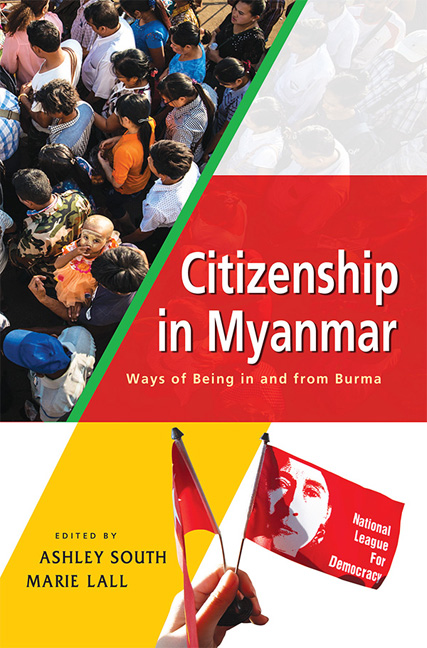Book contents
- Frontmatter
- Dedication
- Contents
- Foreword
- The Contributors
- Map of Myanmar
- Introduction
- 1 Ethnic Politics and Citizenship in History
- 2 Representation and Citizenship in the Future Integration of Ethnic Armed Actors in Myanmar/Burma
- Special Contribution: The Way Forward for Peace, Stability and Progress in Burma/Myanmar
- 3 National Political Dialogue and Practices of Citizenship in Myanmar
- 4 Citizenship and Minority Rights: The Role of “National Race Affairs” Ministers in Myanmar's 2008 Constitution
- Special Contribution: Karenni People at a Glance
- 5 Myanmar's Youth and the Question of Citizenship
- Special Contribution: I Am a Citizen of Myanmar
- 6 “The Value of Life”: Citizenship, Entitlement and Moral Legibility in Provincial Myanmar
- Special Contribution: How I Became Shan
- 7 Conflict and Mass Violence in Arakan (Rakine State): The 1942 Events and Political Identity Formation
- 8 Exploring the Issue of Citizenship in Rakhine State
- Special Contribution: Rohingya and Nationality Status in Myanmar
- 9 Myanmar's Other Muslims: The Case of the Kaman
- Special Contribution: Interview with P'doh Kweh Htoo Win
- Index
3 - National Political Dialogue and Practices of Citizenship in Myanmar
Published online by Cambridge University Press: 28 June 2018
- Frontmatter
- Dedication
- Contents
- Foreword
- The Contributors
- Map of Myanmar
- Introduction
- 1 Ethnic Politics and Citizenship in History
- 2 Representation and Citizenship in the Future Integration of Ethnic Armed Actors in Myanmar/Burma
- Special Contribution: The Way Forward for Peace, Stability and Progress in Burma/Myanmar
- 3 National Political Dialogue and Practices of Citizenship in Myanmar
- 4 Citizenship and Minority Rights: The Role of “National Race Affairs” Ministers in Myanmar's 2008 Constitution
- Special Contribution: Karenni People at a Glance
- 5 Myanmar's Youth and the Question of Citizenship
- Special Contribution: I Am a Citizen of Myanmar
- 6 “The Value of Life”: Citizenship, Entitlement and Moral Legibility in Provincial Myanmar
- Special Contribution: How I Became Shan
- 7 Conflict and Mass Violence in Arakan (Rakine State): The 1942 Events and Political Identity Formation
- 8 Exploring the Issue of Citizenship in Rakhine State
- Special Contribution: Rohingya and Nationality Status in Myanmar
- 9 Myanmar's Other Muslims: The Case of the Kaman
- Special Contribution: Interview with P'doh Kweh Htoo Win
- Index
Summary
Citizenship is undoubtedly one of the more contentious issues in Myanmar today. Much of the discussion focuses on the boundaries of national inclusion, of deciding which groups are officially considered citizens, either according to the 1982 Citizenship Law or according to various other metrics. Most prominent in these discussions is the status of the Rohingya, but the subject is also relevant for other groups on the margins that might either be in danger of being excluded in the future or might be considered for inclusion in the future (such as some Chinese populations). While this is an important aspect of Myanmar's contemporary politics, this chapter focuses instead on an aspect of citizenship that is often ignored: its practice.
The practice of citizenship would include various perspectives on what citizenship entails (the different rights and responsibilities), the roles of state and civil society groups in fostering citizenship, and expectations of citizen participation. This latter category refers not only to ways in which citizens would expect to be able to participate in the political process, but also expectations of the state in facilitating that participation. A discussion of the practice of citizenship should also include attention to the many “skills” of citizenship that go beyond basic rights and responsibilities. While these are potentially applicable to all citizens, this chapter seeks to highlight the ways in which differently positioned individuals might be expected to develop and display different citizenship skills, especially government officials.
Developing a broader understanding of a diverse range of citizenship skills and practices is particularly important in the context of Myanmar's rapid political change. Since at least the 2008 constitutional referendum, the country's citizens have been expected to participate in politics in a variety of ways that were not only not available to them previously, they were actively denied by military-led governments. The result is a situation in which the meaning and content of citizenship is either limited among citizens or expressed in ways that do not necessarily accord with centralized notions of citizenship and participation in Myanmar or with international norms.
An instructive example can be found in a series of studies on citizenship conducted by the research and education organization Myanmar Egress. The researchers note that for field work in 2012 and 2013, they found it necessary to focus on educated middle and lower class respondents.
- Type
- Chapter
- Information
- Citizenship in MyanmarWays of Being in and from Burma, pp. 95 - 112Publisher: ISEAS–Yusof Ishak InstitutePrint publication year: 2017

